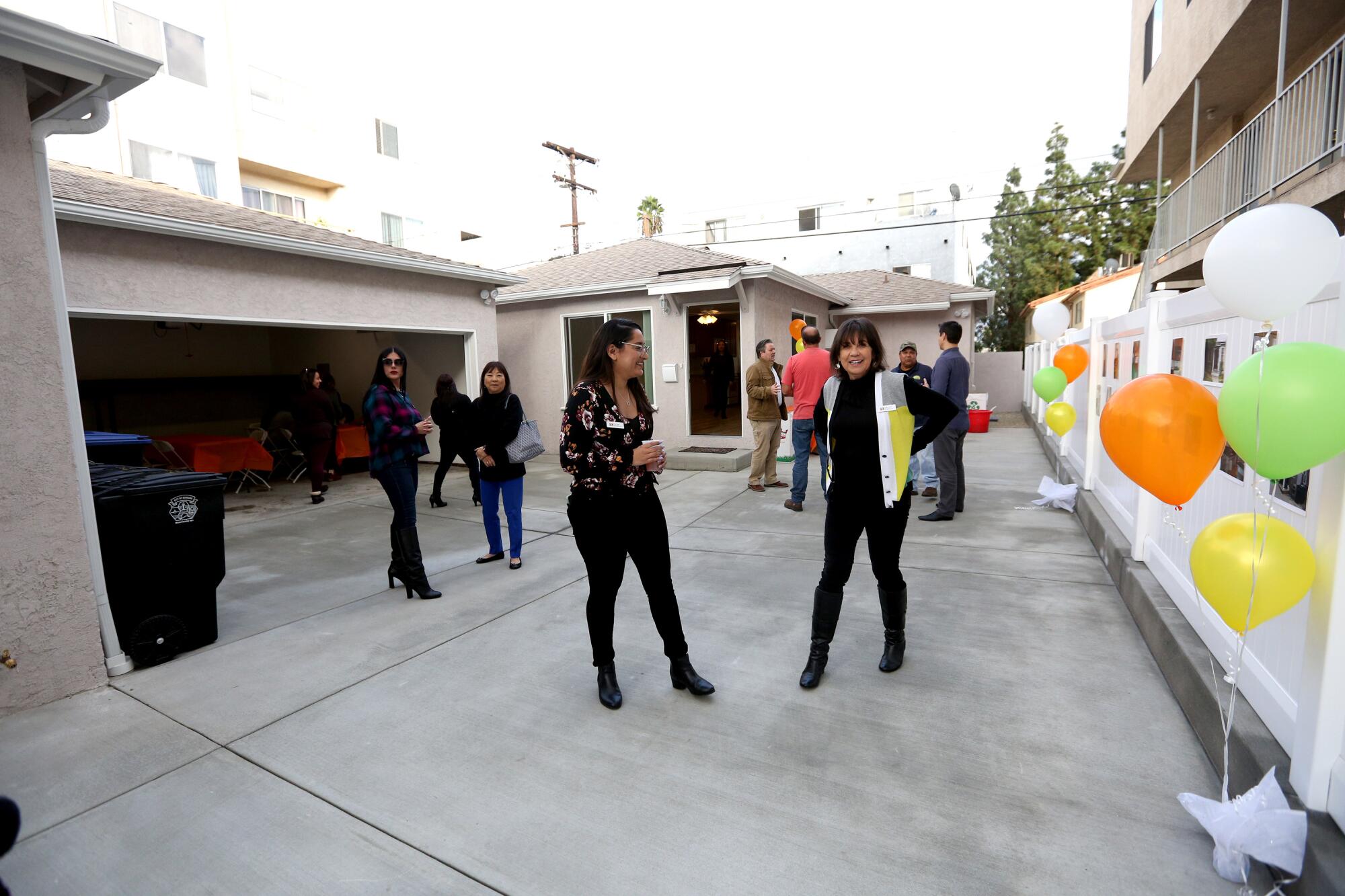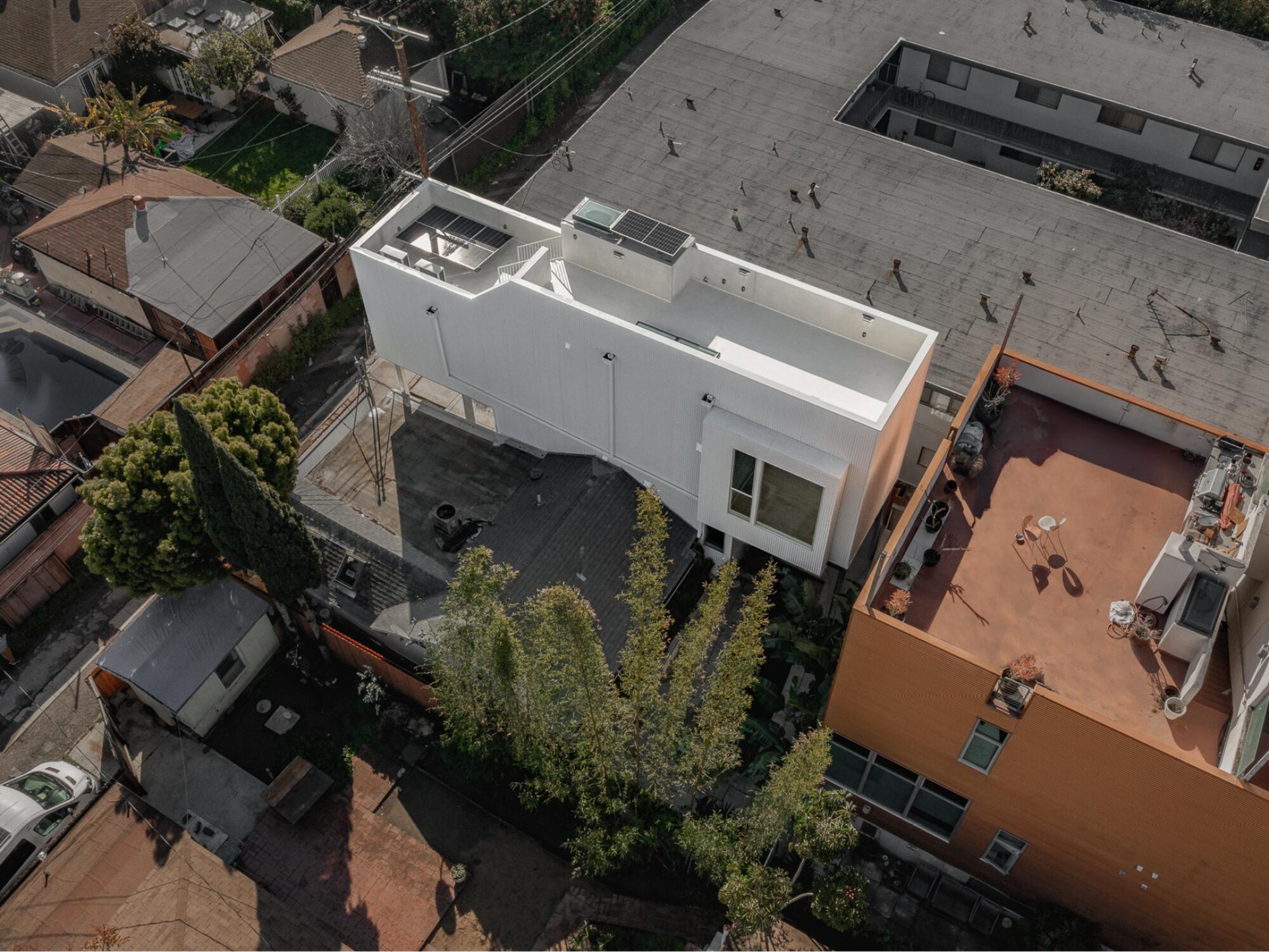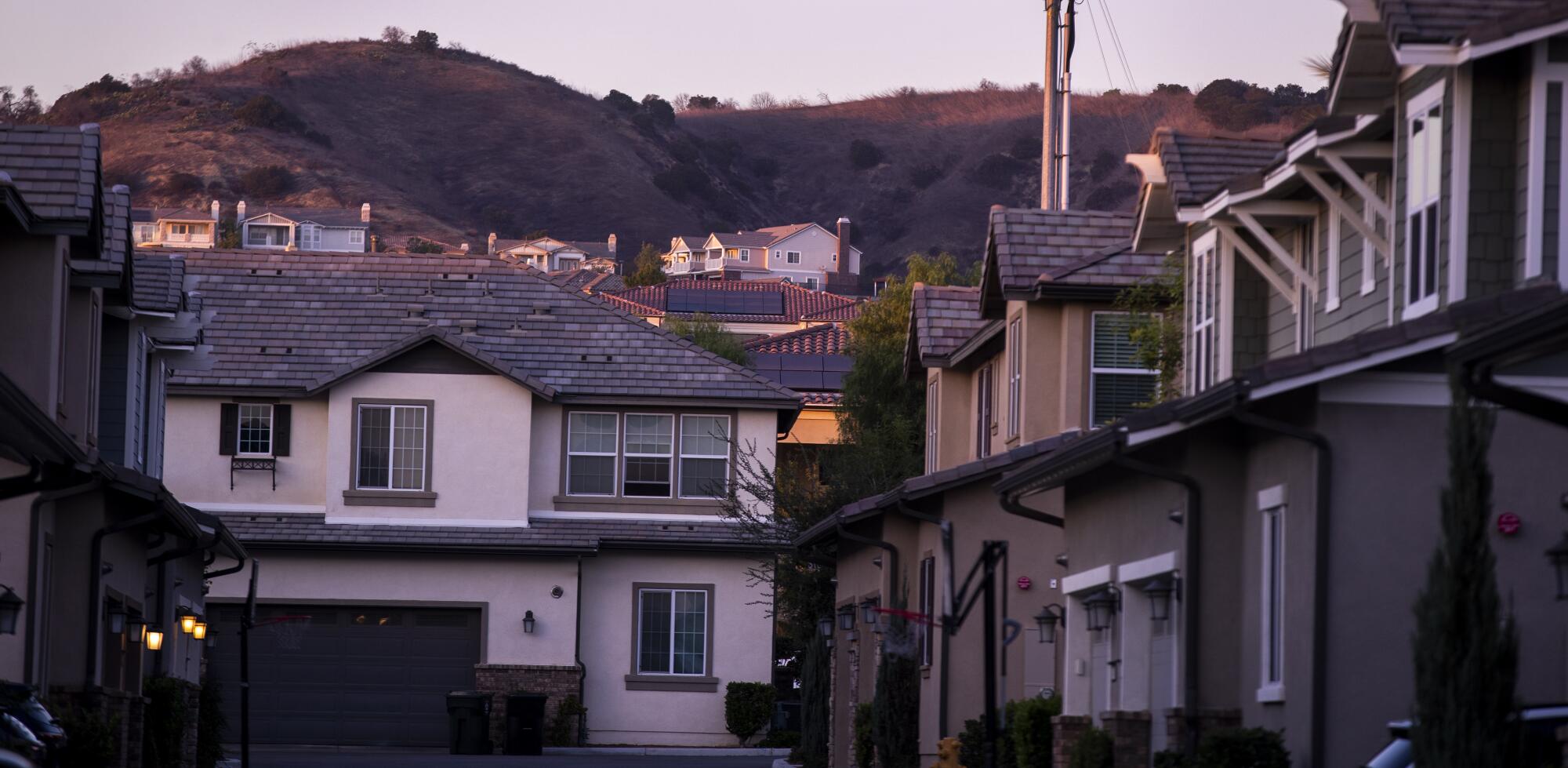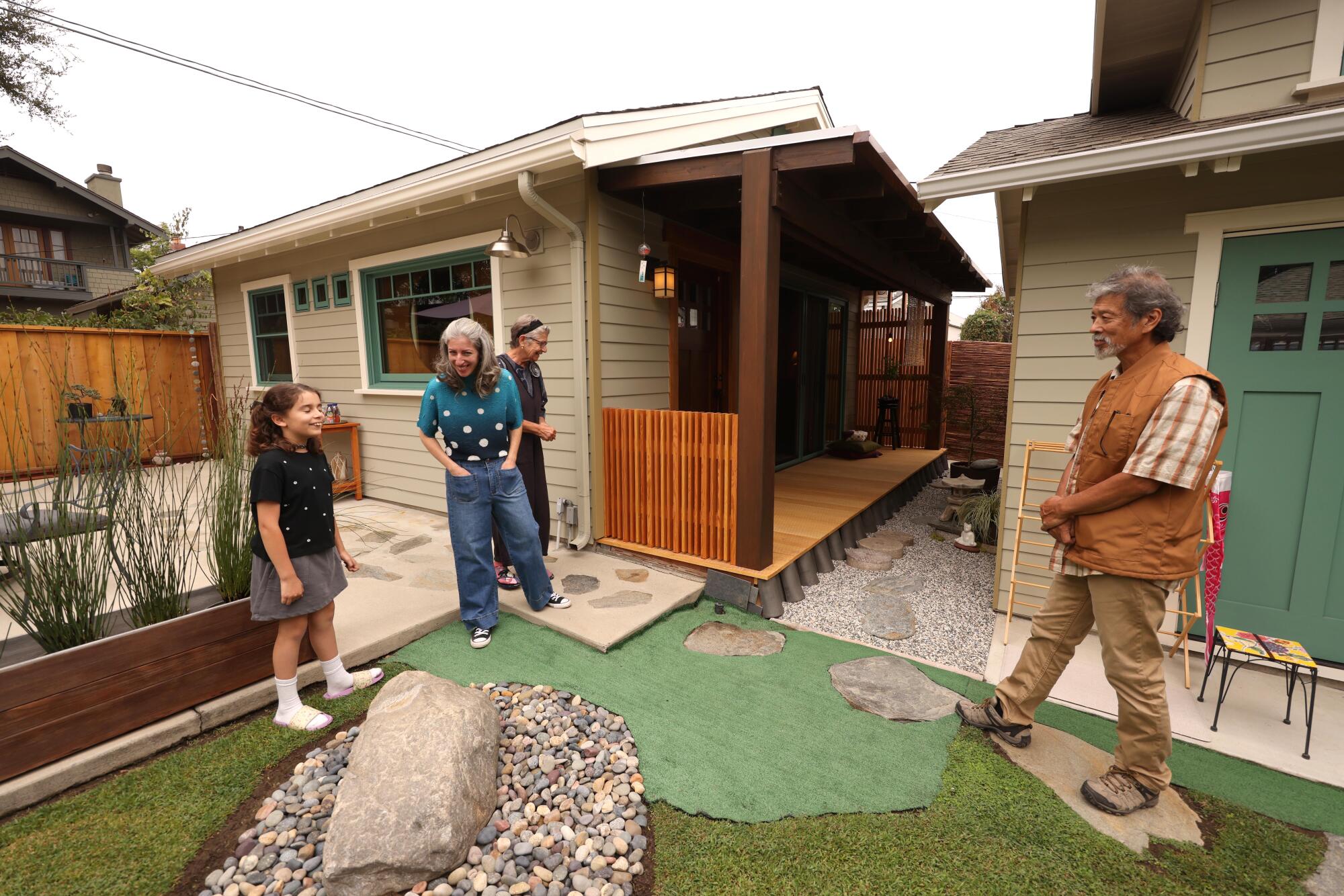During the last century, L.A.’s love affair with the single-family residence has created a suburban sprawl of epic proportions.
Three bedrooms. A white-picket fence. A sq. of grass for the barbecue.
However for a lot of, the dream of residence possession won’t ever be realized. Dwelling costs have soared, wages haven’t stored tempo, and greater than half of L.A. residents lease their residence. What’s extra, the fires in Altadena and Pacific Palisades earlier this 12 months destroyed hundreds of houses, sending droves of householders scrambling again into the rental market.
The Los Angeles Metropolis Council has given remaining approval to a sweeping rezoning plan to satisfy state-mandated housing objectives, clearing the trail for a further 255,000 houses to be constructed. However single-family zones might be left largely untouched; the brand new housing might be developed alongside business corridors and current dense residential neighborhoods. Within the meantime, some municipalities are preventing the state’s housing mandates.

A two-story ADU shares so much with a 1916 Craftsman bungalow.
(Yoshi Makino)
Market fluctuations and legislative uncertainty make predictions difficult. However some observers imagine that by 2050, the destiny of L.A.’s housing inventory might be determined by certainly one of two competing ideologies:
Considered one of them is related to many company landlords and funding corporations, which purchase up rising shares of houses and lease them out to tenants. In the event that they prevail, it’s seemingly that 2050 will look the identical because it does now, solely the chasm between the wealthy and the poor will develop. Dwelling costs will preserve rising, as will L.A.’s share of renters, in line with Tiena Johnson Corridor, normal supervisor of the L.A. Housing Division.
The opposite view comes from a coalition of policymakers, nonprofits and aspiring owners who’re hoping for a future the place L.A.’s houses are inside attain of its working class, and properties are owned by the individuals who stay in them.
Their shared imaginative and prescient appears to be like like this: Denser neighborhoods. Smaller houses, some modular or 3-D-printed. Properties co-owned by buddy teams as a substitute of simply households. ADUs in backyards throughout town, a lot of them separated from their unique properties and acquired and bought as separate houses.
L.A. County Assessor Jeff Prang, who factors out that folks commute to L.A. from Santa Clarita, Palmdale, Lancaster and Riverside, believes folks will begin transferring nearer to town.
“Folks don’t need to stay 40 miles away from L.A. and slog by way of two hours of site visitors every single day. It impacts their high quality of life,” Prang mentioned. “The reply is to extend density, upzone areas and permit multifamily housing.”
However he doesn’t see the battle between the state and native governments (and HOAs that hope to maintain issues the way in which they’re) ending any time quickly.

The Burbank Housing Corp. held an open home to indicate an inexpensive housing mission referred to as the Fairview Cottages in Burbank. There are three single-family houses on the property.
(Raul Roa / Los Angeles Occasions)
Sacramento has just a few instruments at its disposal, together with what’s colloquially often known as builder’s treatment, a penalty for cities that don’t adequately plan for California’s inevitable inhabitants enhance. California cities are required to provide a housing plan each eight years that brings zoning for added housing. In the event that they fall far sufficient behind on that plan, builders in these cities can basically ignore native zoning restrictions and construct no matter they need, so long as the mission features a handful of inexpensive housing items.
A handful of cities have fallen behind on their plans, and builders capitalized, getting the inexperienced gentle for high-density initiatives that wouldn’t be permitted in any other case.
At the moment, housing aspect legal guidelines solely require cities to plan and zone for added housing. However by 2050, the state may go additional, forcing cities to allow and encourage housing development and punishing people who don’t.

A drone shot exhibits a two-story ADU, which rests an inch from a Nineteen Twenties bungalow and 5 toes from a Nineteen Nineties duplex and some toes from a dingbat house to the south.
(Steve King Architectural Imaging)
Crucial instrument for shaping the way forward for L.A. housing could very effectively be Senate Invoice 9, which makes it simpler for California owners and builders so as to add density by splitting single-family heaps in half and constructing duplexes, townhouses and ADUs.
Due to a handful of payments that make ADUs simpler and sooner to construct, Prang mentioned ADU purposes have skyrocketed for the reason that legislation handed in 2021, and his workplace spends round 40% of its time processing them. Many purposes this 12 months have come from fireplace victims trying to construct ADUs shortly to stay in whereas they rebuild their houses.
In the present day, constructing takes time. There are a dozen governmental companies concerned, and initiatives get mired in crimson tape. However Prang mentioned by 2050, he expects there to be a single portal that consolidates all of the purposes and checkpoints required, so new developments may be green-lit in weeks or months, not years.
L.A., the place 72% of residential land is zoned for single-family use, can also be trying to Measure ULA to assist mitigate its housing woes. The measure, which took have an effect on in 2023 and brings a switch tax to property gross sales above $5 million, has already raised greater than $660 million for housing and homelessness initiatives.
It’s a polarizing coverage. A current evaluation from UCLA’s Lewis Middle for Regional Coverage Research — titled “The Unintended Penalties of Measure ULA” — suggests the tax has chilled a once-robust market in L.A., whereas gross sales above $5 million have remained regular in different markets throughout L.A. County not affected by the tax. However by 2050, Measure ULA will seemingly have raised tens of billions of {dollars} — an unprecedented amount of money that, if used successfully, has the potential to resolve lots of the cities housing woes.
“We’ll use these funds to convey housing to market sooner and have a look at artistic fashions for home-ownership — issues we haven’t been in a position to do for lack of funding,” mentioned Johnson Corridor, whose Housing Division oversees Measure ULA.

Three- and four-bedroom townhomes combine with single-family houses within the background in Yorba Linda.
(Allen J. Schaben / Los Angeles Occasions)
“Different cities are grabbing our youth. Seattle and Denver supply extra inexpensive houses with walkable facilities,” Johnson Corridor mentioned. “Our economic system relies on giving these 20- to 30-somethings a purpose to remain right here.”

Actual property agent Christopher Stanley is all too conversant in L.A.’s grueling utility course of for constructing, rebuilding, and even transforming. He makes a speciality of tenancy-in-common properties, a type of possession the place residents share possession of a property.
The TIC mannequin typically comes within the type of builders changing single-family houses with townhouses, splitting one home into two. Stanley mentioned there’s loads of demand for it, for the reason that price-per-square-foot sometimes runs about 25% lower than single-family properties, however the prolonged allowing course of makes it unattractive for a lot of builders.
By 2050, Stanley mentioned AI may make the allowing course of so fast and painless that not solely house-flippers and builders, but in addition particular person owners, may add density to their neighborhoods. Single-family houses turn out to be duplexes. Empty backyards turn out to be heaps for ADUs.

A 650-square-foot ADU behind an 1890 residence in Los Angeles.
(Myung J. Chun / Los Angeles Occasions)
“It’s the simplest method to get inexpensive housing inventory onto the market,” Stanley mentioned. “However altering the legal guidelines might be essential.”
For Stanley, the most important enhance would come if extra cities enable ADUs to be bought as separate properties, not simply rented — a development that has already caught on up the coast in Oregon and Washington. California’s Meeting Invoice 1033 permits such gross sales, however cities need to opt-in. San Jose was the primary in 2024, and some Bay Space cities adopted. However Southern California, a area that has grown accustomed to the single-family life-style, hasn’t been as desirous to undertake the thought.
“If we would like extra folks proudly owning their houses as a substitute of renting, we now have to make ADUs one thing you should purchase,” he mentioned.
In 2016, Stanley mentioned, he bought a 900-square-foot tiny home in Boyle Heights to a 31-year-old for $375,000. The client used it as a means into the market, and three years later, they bought it for $515,000 and upgraded to a much bigger mid-century residence in Mount Washington. He mentioned if costs and wages proceed the way in which they’re going, ADUs and tiny houses would be the simplest way into the marketplace for younger folks.
“They’re a leaping off level. It’s the quickest method to cease paying your landlord’s mortgage and begin paying your personal,” he mentioned. “It’ll be occurring much more by 2050.”
Houses received’t be the one issues altering in 25 years. The folks filling them will, too.
The twentieth century noticed the rise of the nuclear household, and most houses had been purchased and occupied by mother and father and their kids. However as of late, younger persons are ready to get married — in the event that they’re getting married in any respect — and never having as many kids.
Mix that with their lack of ability to afford a house within the first place, and we’ll quickly see the rise of co-buying: Teams of pals entering into on a Silver Lake bungalow. Two households splitting an Eagle Rock Craftsman. Mother and father buying a Mid-Metropolis property together with their grownup kids.

An aerial view of Valencia. A vertical metropolis could tempt folks from the suburbs who not have the dream of a single-family residence.
(Robert Gauthier / Los Angeles Occasions)
Matt Holmes is the chief govt of CoBuy, an organization that helps teams of individuals co-buy houses and collectively handle the property. He mentioned California is its greatest market because of the value of houses outpacing wages throughout the state.
The corporate’s knowledge don’t return that far, however in 2023, a CoBuy survey discovered that roughly 27% of U.S. residence gross sales had been purchased by co-buyers — teams past married {couples}. The identical 12 months, knowledge from the Nationwide Assn. of Realtors confirmed that co-buyers made up a bit much less of the marketplace for first-time homebuyers at roughly 19%. Both means, it’s a giant hike from just a few many years in the past, when the development was nearly nonexistent.
“It’s an expedited path to residence possession, and it helps folks achieve entry to a broader swath of housing inventory past simply starter houses,” he mentioned.
Holmes co-founded the corporate along with his mom a decade in the past. During the last 12 months and a half, he mentioned, buddy teams have taken over household teams as his greatest shoppers.

If neighborhoods get denser, houses get smaller, and shared houses turn out to be extra frequent, one issue typically related to single-family houses might be up within the air. What occurs when all you may afford is a cramped 500-square-foot ADU? Or the grassy yard the place your canine used to run round is changed by a two-story townhouse?
Angelenos will in all probability spend extra time outdoors the home in 2050. Because of this, parks and communal areas will turn out to be not only a need, however a necessity.

An ADU in South Pasadena.
(Genaro Molina / Los Angeles Occasions)
“In Los Angeles, our parks embrace all the pieces from neighborhood recreation facilities and open areas to theaters, seashores, lakes, aquariums, equestrian facilities, golf programs, historic houses and gardens. They’re the shared treasures of our group,” mentioned Lindsey Kozberg, govt director of the Los Angeles Parks Basis, a nonprofit that fashioned in 2008 as a response to finances cuts to park applications throughout the recession.
Kozberg mentioned parks funding may very well be at risk as soon as once more, given the practically $1-billion finances shortfall town is dealing with. If the development continues, by 2050, it’ll seemingly require a mixture of philanthropic funding and group partnerships to ensure each Angeleno has a protected and accessible park to go to.
“There are greater than 500 parks throughout town alone, and so they embody a wild and fantastic assortment of areas,” she mentioned.
By 2050, town may have much more by merely rethinking areas that exist already. Kozberg prompt changing neighborhood schoolyards into public parks on nights and weekends — a cheap choice for the reason that metropolis wouldn’t need to construct something new.
Jordan Lang, president of McCourt Companions, mentioned gathering locations have turn out to be a lot extra necessary within the age of the web, and investing in them is important to the expansion of town.
Lang serves as president of Aerial Speedy Transit Applied sciences, the restricted legal responsibility firm behind the controversial proposed gondola system that may take baseball followers from Union Station to Dodger Stadium. The aerial transportation hasn’t been permitted, because the environmental influence report wants sign-off from a handful of presidency companies.
“This can be a check case of what we will do in L.A.,” Lang mentioned, including that it could additionally serve close by Elysian Park, getting folks out of their automobiles and into inexperienced areas.
By 2050, he envisions large, well-funded parks and public areas full of folks each day and evening. Such areas might be inviting, continually programmed with group occasions, and straightforward to get to through public transportation.
“L.A. is an unimaginable place to stay,” Lang mentioned. “Folks will preserve transferring right here. We have to create a metropolis that makes them need to keep.”




